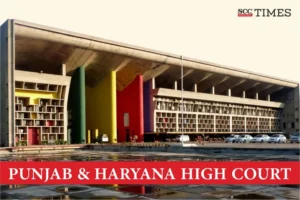Punjab and Haryana High Court: Petitioner, an elected member of Punjab Legislative Assembly from Amargarh Constituency, Malerkotla had challenged the arrest order dated 06-11-2023, grounds of arrest dated 06-11-2023 and all subsequent proceedings including the remand order dated 07-11-2023. The Division Bench of Anupinder Singh Grewal* and Kirti Singh, JJ., opined that in the present case, written grounds of arrest were communicated to the petitioner on the day of his arrest. Therefore, there was substantive compliance of Section 19(1) of the Prevention of Money Laundering Act, 2002 (‘PMLA’). Further, the Special Court considered the nature of the case against petitioner and the factum of his non-cooperation while remanding him into the police custody. Thus, the Court opined that the remand order was passed with application of mind and not mechanically or in a routine manner.
Thus, the Court opined that the petitioner’s arrest was in consonance with Section 19(1) of the PMLA and since there was no manifest illegality in the orders of remand and subsequent proceedings therefore the present writ petition was dismissed.
Background
On 01-12-2020, a written complaint was made by the Deputy Zonal Manager (Recovery) Bank of India to Central Bureau of Investigation (‘CBI’), Anti-Corruption Branch, wherein it was alleged that the petitioner, who was the Director and Guarantor of Tara Corporation Ltd., which comprised of his family members as Directors and Guarantors, had availed cash credit facility amounting to Rs. 46 Crores from M/s Tara Corporation Limited, but the funds were diverted to other companies and even a sum of Rs. 3.12 Crores was deposited in petitioner’s personal account. Thus, the FIR dated 28-03-2-2022 was registered by the CBI under Sections 420, 421, 406, 409 read with Section 120-B of the Penal Code, 1860 with Section 13(1)(d) of the Prevention of Corruption Act, 1988 and ECIR dated 23-05-2022 was recorded by Directorate of Enforcement (‘ED’).
Petitioner was issued five summons from 04-08-2023 up to 06-11-2023 to appear before the ED officials but petitioner expressed his inability to come and join the investigation because he was in Canada till 25-09-2023, and later due to his medical condition. The ED stated that officials went to his office premises in Malerkotla on 06-11-2023 for effecting the service of summons and officially arrested the petitioner on 06-11-2023 at Jalandhar.
Thus, petitioner filed the present petition and submitted that he had been arrested in contravention of provisions of Section 19(1) of the PLMLA insofar as there was non-compliance on the part of the Investigating Officer regarding the provisions of Section 19(1) of the PMLA. The question which arose for consideration was whether Section 19(1) of the PMLA were complied with before effecting the arrest of the petitioner.
Analysis, Law, and Decision
The Court referred to Ram Kishor Arora v. Enforcement Directorate, 2023 SCC OnLine SC 1682, wherein it was held that if the written grounds of arrest had been communicated to the accused and signed by him, it would be sufficient compliance of Section 19(1) of the PMLA and Article 22 of the Constitution. In the present case, written grounds of arrest were communicated to the petitioner on the day of his arrest. Therefore, there was substantive compliance of Section 19(1) of the PMLA.
Further, the Court rejected the petitioner’s contention that the entire ‘material in possession’ against the arrested petitioner, including the memo of arrest and the grounds of arrest had been sent to the adjudicating authority on 08/09-11-2023, whereas it should have been sent immediately, hence there was a violation of Section 19(2) of the PMLA. The Court opined that such contention was rejected as it was not specified that information had to be sent on the same day the arrest was affected. Even if it had been sent after two days, it could not be said that the provisions of Section 19(2) of the PMLA had not been complied with.
The Court refused to accept the petitioner’s contention that Special Court did not express satisfaction regarding compliance of Section 19(1) of the PMLA. The Court opined that it was trite that it was duty of the Special Court that when the accused was produced before it in compliance of Section 19(3) of the PMLA, the Special Court should satisfy itself regarding Section 19(1) of the PMLA and whether the arrest was made after following the procedure laid therein. In the present case, the Special Court considered the nature of the case against petitioner and the factum of his non-cooperation and other relevant factors while remanding the petitioner into the police custody. Thus, the Court opined that the remand order which ran into six pages was passed with application of mind and not mechanically or in a routine manner.
Thus, the Court opined that the petitioner’s arrest was in consonance with Section 19(1) of the PMLA and since there was no manifest illegality in the orders of remand and subsequent proceedings therefore the present writ petition was dismissed.
[Jaswant Singh v. Union of India, 2024 SCC OnLine P&H 4151, decided on 24-05-2024]
*Judgment authored by- Justice Anupinder Singh Grewal
Advocates who appeared in this case :
For the Petitioner: Randeep S. Rai, Senior Advocate and Anand Chhibber, Senior Advocate; Vikram Chaudhari, Senior Advocate with Shikhar Sarin, Rubina Virmani, Shreya B. Sarin, Hargun Sandhu, Advocates;
For the Respondents: Satyapal Jain, Addl. Solicitor General of India with Lokesh Narang, Senior Panel Counsel.

